Sheila’s story
Shared by Sheila’s husband, Ray.
My wife Sheila and I had just celebrated 41 years of marriage together and our three children, Nic, Jo, and Andy, were all in their thirties.
In early September 2008, while on holiday in Cornwall, I noticed that on occasion Sheila’s coordination and behaviour seemed unusual, and she lost peripheral vision at times. Nothing was too concerning until after we had arrived home.
The day after we got back, I was in the kitchen making lunch and Sheila was in the living room and decided to tackle the pile of ironing. She called through to me ‘Ray, could you put the ironing board up for me?’. I asked why, and she said she didn’t know which way round it went. I put it up, asked if she was ok, and she said she was fine so I went back to the kitchen. The next thing I heard was a crash and a shout, so I ran through to find Sheila lying on the sofa with the ironing board on top of her. She remembered trying to move it but couldn’t see properly. With it being a weekend, I called the out-of-hours number immediately, and an emergency doctor took my call and wanted to see Sheila straight away.
The doctor, who told me his background included brain surgery, did some tests and he could see that Sheila’s coordination was poor and she was confused. A bed was found for her in the neurology department at the John Radcliffe Hospital and Sheila was fast-tracked in for a scan.
This is when we were told the unthinkable news, on our son Andy’s birthday, that Sheila had a grade four glioblastoma brain tumour, and she would need an operation immediately to help relieve some of the pressure in her head. The whole family were in total shock and felt numb, but we did our best to ready ourselves for the surgery.
The operation went well for Sheila, and it seemed to make her feel a lot better. Hope kicked in, but we were told that this sometimes happens and that eventually Sheila would drift back to feeling very unwell.
We were struggling to understand how the tumour would continue to affect Sheila, and we were told that sadly there was no way back from this. I won’t forget how the surgeon described it to us: ‘picture the brain with all of its crevices and contours, then picture the tumour as an octopus with many small tentacles spreading through it’. It would mean that, depending on where the pressure was, some days Sheila would be able to feed herself, her sight would improve, and she would be able to write, and other days she would be unable to do these things.
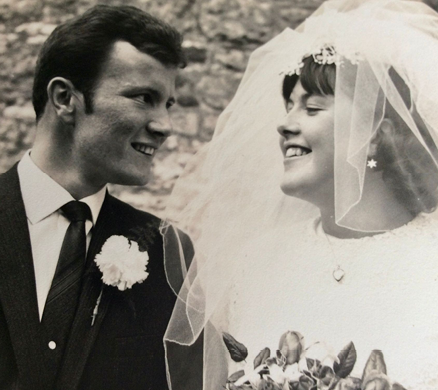
Pictured: Ray and Sheila
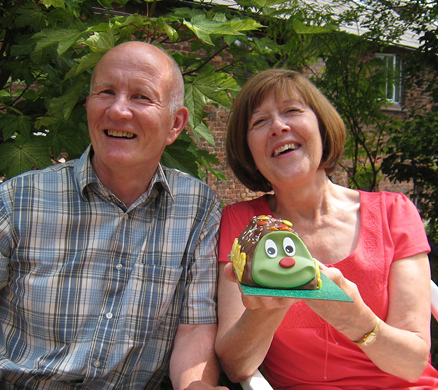
Pictured: Ray and Sheila
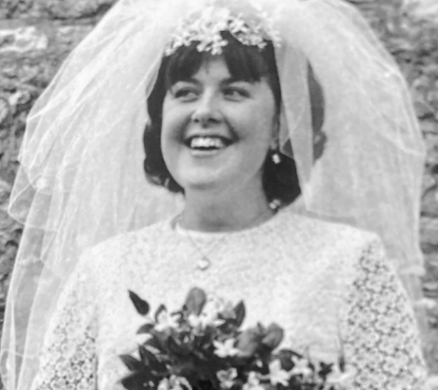
Pictured: Sheila
Sheila spent six weeks at the John Radcliffe before being moved to the Churchill Hospital. At the time, the cancer wing that exists today was being built, and unfortunately the ward that Sheila was on was very busy and noisy. The nursing staff were so lovely and caring and were doing their best with the facilities and environment they had, but it wasn’t ideal. We were told that Sheila’s condition would soon worsen, and she would need palliative care.
This is when we were introduced to Sobell House. From that point in November when Sheila was admitted to Sobell House it was like she was wrapped in a cloak of peace. Her face brightened and she couldn’t believe the love and care that she was receiving. It was wonderful, and such a calm place after the hospital wards. The staff at Sobell House are so caring, humble, loving, and warm – in fact, there’s not enough lovely words to describe them. All of this is shown to the family too – they have hearts of gold, and nothing is too much trouble.
During her admission, Sheila made use of the many services Sobell House has to offer, such as music and art therapy. By this point, Sheila didn’t have too much control, but she would nod along to the music, and splash about with the paint. She loved it! Another wonderful therapy on offer was the hand and foot massages she received. That’s one of the great things about Sobell House, they help you to keep on living while you’re there and give you more quality of life in the limited time you have.
By the end of November, a home care package was arranged for Sheila and a bed was brought downstairs so she could be looked after at home. All was fine for a few days, but it quickly became obvious that even with all the care things were becoming very difficult, so the decision was made for Sheila to go back into Sobell House where she felt most settled. At this point, Sheila was aware that she was dying and that her time was limited, and she was at peace with that – she had great faith which helped too. It was her wish to die at Sobell House.
After a couple of weeks back at the hospice Christmas morning came, and Sheila said that she would like to have her last Christmas dinner at home. We went to collect her and she seemed excited. However, once we got home Sheila found it overwhelming and she became quite unsettled and agitated. She wanted to go back to Sobell House as it had become a very safe space for her, so we moved the rest of her last Christmas day back into the hospice.
There was one night in January that I will always remember. Sheila was having steroid treatment which made her very hungry – even after dinner! She told us that she fancied fish and chips, so my son-in-law went to pick us up a late supper. The nurses thought it was a great idea and told us they would set up the table in the family room so we could all eat together. They even looked out the nice cutlery, crockery and some candles just to make it nice for Sheila.
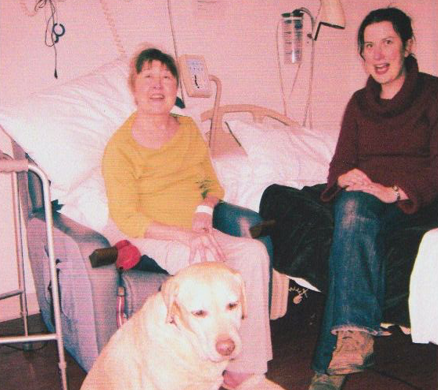
Pictured: Sheila with her daughter Nic and Muffin the dog
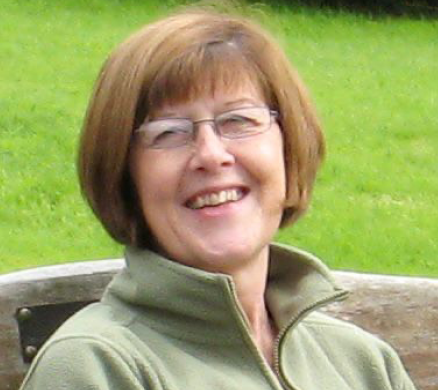
Pictured: Sheila
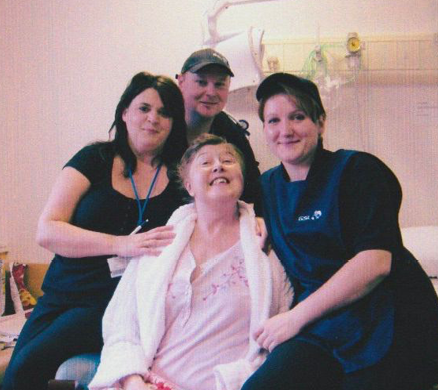
Pictured: Sheila with hospice staff
Sheila’s great loves in life were her precious family, people, and animals – particularly our cats Chloe and George, and other people’s dogs! Mandi the housekeeper saw the photos we’d put up around the room and realised Sheila’s fondness for cats. Amazingly, Mandi decided to bring in the new-born kittens she had at home, which made Sheila’s day. It really is the little things that make such a difference at the end of life.
Later that month, the consultant very gently and kindly said to us that he was sorry, but as Sheila’s condition had now stabilised, and they couldn’t give a timeframe on how long she had, we would need to look into moving her into a nursing home. We understood that beds were precious at Sobell House, but we were sad to leave.
The nursing home in Oxford was so kind to us, as were many friends, and we had an amazing offer of financial help to cover the high cost of care. However, Sheila was only there for ten days before I received the phone call that everyone dreads – Sheila had slipped into a coma. The care home staff were aware that Sheila wished to die at Sobell House and helped transfer her back to the hospice.
The next few days were a blur – Sheila’s major organs were failing and we knew that these would be her final days of life. We contacted our son Andy, who was living and working in Japan at the time and was encountering some issues getting a flight home. The team at Sobell House were so proactive and helpful in making sure he could get back to the UK as quickly as possible.
On 2 February 2009, me and my daughters Jo and Nic left the hospice and went home for the night. I was woken up at 2:15am to the news that Sheila had died. My son Andy was still on his way to the airport in Japan, many hours from home. I drove straight to the hospice and said my final goodbye to Sheila. The staff were so kind and gave me time with her. She looked so peaceful.
I went to pick Andy up from the airport later that day. He came through the gate, saw me, and I didn’t have to tell him the news. He knew at that moment that his mum had died. We hugged and cried together.
I received counselling from the Sobell House bereavement team, which was so very helpful, and I also volunteered at the hospice from 2012 to 2020 helping on reception, the ward desk, and in many other ways. I loved being part of the team, frequently receiving far more than I was giving.
Life at Sobell House has taught me that it’s ok to cry and it’s ok to laugh when you’re facing the passage from life to death. There are no rules, and you feel every emotion under the sun. Only 19 weeks passed from Sheila being diagnosed to leaving us.
Thank you to everyone at Sobell House who cared for Sheila – you helped us in more ways than we could ever imagine. Thank you also to the friends at the hospice I’ve made along the way. For me, Sobell House is and always will be a big warm hug.
Thank you so much to Ray for kindly sharing his family’s experience of Sobell House.
If your loved one was cared for by our team and you would be comfortable to share your story with our supporters, please fill out our story form.